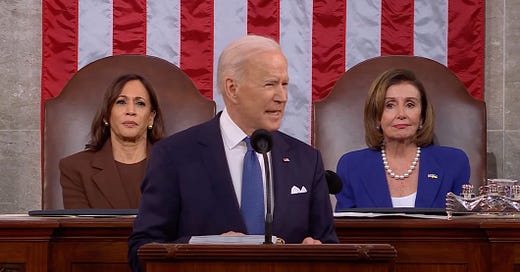The Triumph of War
Russia's invasion of Ukraine has been a gift for hyper-militarism and nationalism on all sides of the conflict.
President Biden’s State of the Union address was marked by high-profile moments of partisan disunity, but on one issue, there was universal consensus: war.
Because let there be no doubt that, even though there are no U.S. or NATO troops on the ground in Ukraine (and thank god for that) we are clearly waging a kind of war against Russia. The crippling sanctions, the military buildup along Ukraine’s borders, the crackdown on Russian state media, the promised asset seizures—these are all forms of modern warfare. And there is joy in the halls of Congress about all of it, from virtually every wing of both parties.

Watching Biden speak about Ukraine—watching him be cheered to the rafters for announcing that the United States was flooding oil markets in the same week as the UN issued yet another catastrophic climate change report; noting the rapturous response to his vow to fight Russia if it enters NATO territory; seeing the satisfaction on his face as he boasted about how much the Russian economy is tanking—what I mostly felt was profoundly depressed. The Russian invasion has been a triumph for war, militarism, and nationalism on all sides of the conflict. Defense stocks are up. Countries like Germany are massively increasing their military budgets. Countries like Finland which were deeply ambivalent about NATO are changing their mind. In the UK, Keir Starmer is using the crisis to purge his internal enemies on the left for the ostensible crime of critiquing NATO. Here in America, prominent commentators are ramping up anti-Russian rhetoric:

Taken together, this is a long-term catastrophe for anyone who believes that the hyper-militarization of the world is an impediment to lasting peace. The xenophobia, the glorification of battle, the thirst for punishment, the eagerness to tarnish even mild dissent as pro-Putinism—all of this is exactly the opposite of the kind of society we should be trying to create, and it will only push us further down the road of perpetual warfare. To be clear, it is Putin’s horrific decision to invade Ukraine that has flung this particular Pandora’s box so fully open. But the forces he has unleashed spread far beyond Ukraine’s borders. They will seep into both global and domestic politics for years and years to come. And they will help bolster the hard-right turn that U.S. politics is already taking on questions of “law and order,” because ideologies of violence always come home.
I could see all of this happening as I watched NBC News after Biden’s speech ended. There was universal consensus that he had somehow not gone far enough in his Ukraine comments. Richard Engel, last seen blithely advocating a potential nuclear standoff with Russia, wondered why Biden hadn’t announced “new sanctions” or “more help” (by which he meant more military help) for Ukraine. Chuck Todd and Savannah Guthrie lamented that he didn’t speak in “good versus evil” terms about the conflict, and Guthrie later mused aloud that it might not be “sustainable” for the White House to continue to insist that the U.S. would not engage directly in Ukraine. Andrea Mitchell pointedly noted that Biden had not matched Putin and raised the alert level for American nuclear weapons, sniping that instead, Biden was trying to “ignore” his Russian counterpart’s move. The thirst for more “toughness,” for more hawkish posturing, for more war, was palpable.
One place where NBC’s analysts did have good marks for Biden? The (frankly chilling) moment when he cried, to bipartisan cheers, “Fund the police! Fund them! Fund them!” War fever at home and war fever abroad—what a bleak time we are living through.






As grim as this all is, that screenshot is hilarious. Just three ghouls in skin suits trying to approximate human emotions.